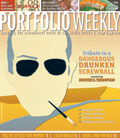In 1972, I was a twenty year old subscriber to Rolling Stone magazine. I had begun reading Rolling Stone three years earlier, when it was first available in these parts at one or two news stands, because it was the best source for information on rock music. An added bonus was its countercultural perspective on politics.
Hunter S. Thompson covered the presidential campaign that year for Rolling Stone, sending regular dispatches to Editor Jann Wenner via the “Mojo Wire,” apparently just at or right after deadline. His writing was unlike any other during that campaign season, the first election I could vote in. I read the daily newspaper and Time magazine, but Thompson’s perspective was unique, filled with both elucidation and diatribe. And his writing style was exhilarating, making himself a primary character in the ongoing campaign drama:
“I am growing extremely weary of writing constantly about politics. My brain has become a steam-vat; my body is turning to wax and bad flab; impotence looms; my fingernails are growing at a fantastic rate of speed---they are turning into claws; my standard size clippers will no longer cut the growth…”
Thompson’s tales of personal drunkenness, drug use and craziness seemed implausibly exaggerated to me (though apparently they weren’t), but the behind the scenes insights and first person reportage were intoxicating.
I wouldn’t say Hunter S. Thompson was an influence on my own writing, except as a force for liberation. And every time I place myself into one of my own pieces, I think of him. Was he the first guy to do that? I honestly don’t know. But I do know that journalism became a different animal in the succeeding years (sometimes for better, sometimes not) and I’m certain that Hunter S. Thompson is one of the reasons why.
--- Jim Newsom
copyright © 2005 Port Folio Weekly. Used by Permission.

